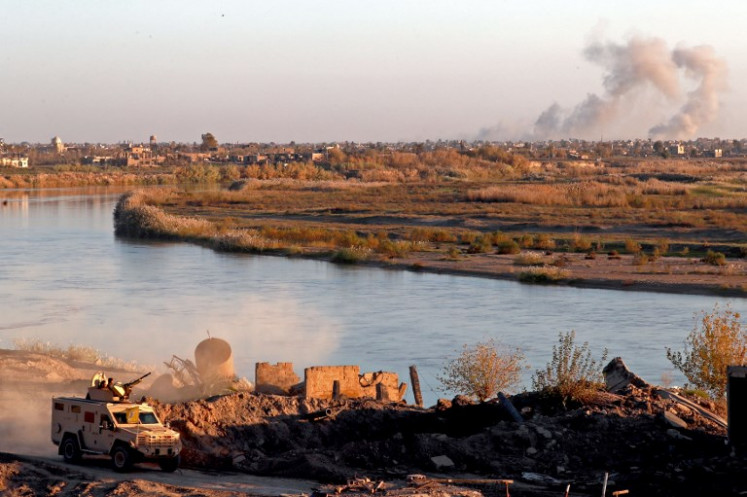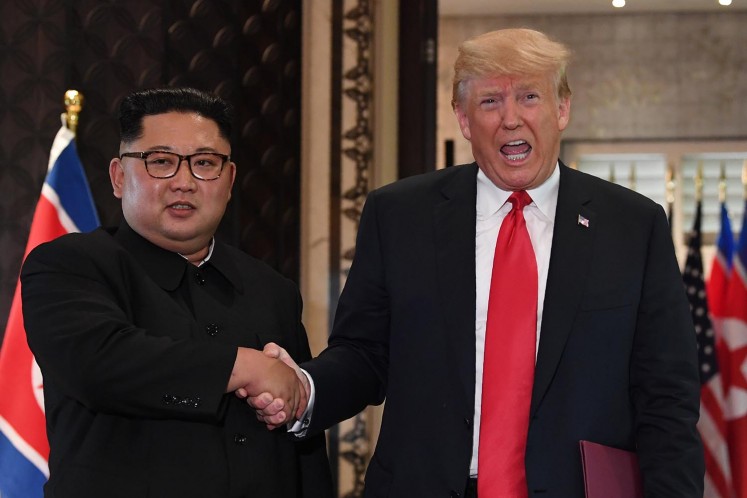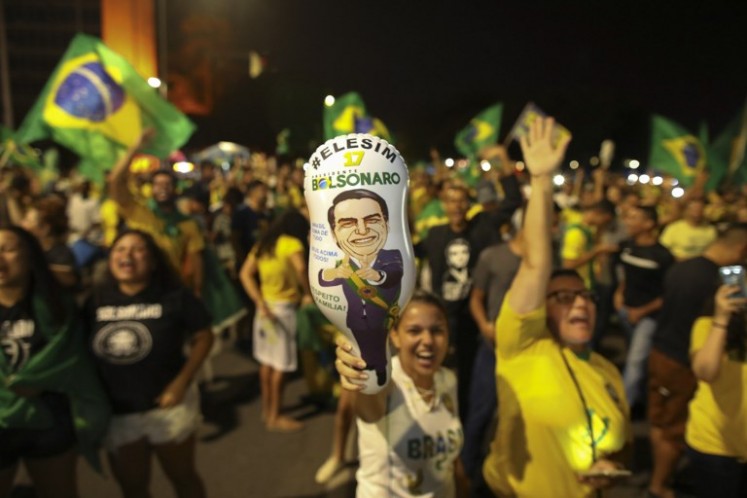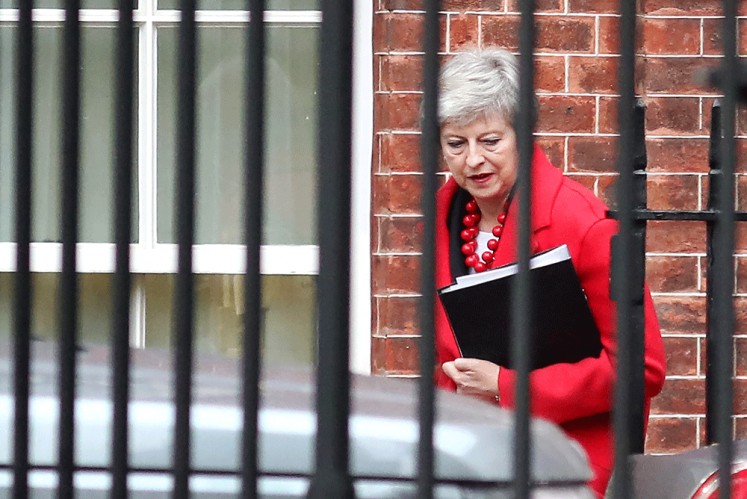Popular Reads
Top Results
Can't find what you're looking for?
View all search resultsPopular Reads
Top Results
Can't find what you're looking for?
View all search resultsEvents that marked 2018
Change text size
Gift Premium Articles
to Anyone
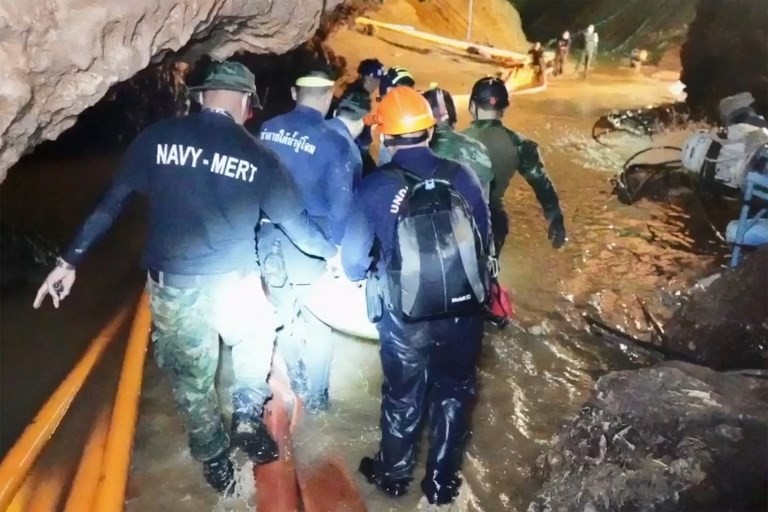 This handout video grab taken from footage released by the Royal Thai Navy on July 11shows rescue personnel during the rescue operation for members of the 'Wild Boars' Thai youth football team inside the Tham Luang cave in Khun Nam Nang Non Forest Park in Mae Sai district. The rescue mission is to get the Hollywood treatment in a movie announced by production house Pure Flix. (Handout/ROYAL THAI NAVY/AFP/-)
This handout video grab taken from footage released by the Royal Thai Navy on July 11shows rescue personnel during the rescue operation for members of the 'Wild Boars' Thai youth football team inside the Tham Luang cave in Khun Nam Nang Non Forest Park in Mae Sai district. The rescue mission is to get the Hollywood treatment in a movie announced by production house Pure Flix. (Handout/ROYAL THAI NAVY/AFP/-)
F
rom a spy drama that poisoned ties between Russia and the West to major US turnarounds under President Donald Trump, here are some of the major events that marked 2018.
Russian spy poisoning saga
On March 4, Russian former double agent Sergei Skripal and his adult daughter are discovered unconscious and poisoned by a highly toxic nerve agent, Novichok, on a bench in Salisbury, England.
London points the finger at Moscow and in September issues arrest warrants against two Russian operatives. Moscow rejects all charges.
Angry exchanges between the two capitals bring in other Western nations behind London. Dozens of Western and Russian diplomats are expelled in tit-for-tat reprisals, and new sanctions are brought against Russia.
The Skripals survive but in June a British woman dies after coming into contact with Novichok in a village outside Salisbury. Her partner falls gravely ill.
Syria regime victories
On April 14, the Syrian army declares that all anti-regime forces have been forced out of the Eastern Ghouta area adjoining Damascus after a blistering two-month offensive that leaves more than 1,700 people dead.
Smoke billows after bombings in the Deir Ezzor province as a vehicle of the Syrian Democratic Forces (SDF) stops in Hajin, in the Deir Ezzor province, eastern Syria, on Dec. 15. Kurdish-led forces seized the Islamic State's main hub of Hajin on Dec. 14, a milestone in a massive and costly US-backed operation to eradicate the jihadists from eastern Syria. The Syrian Democratic Forces secured Hajin, the largest settlement in what is the last pocket of territory controlled by IS, the Syrian Observatory for Human Rights said. (AFP/Delil Souleiman)It is a major victory in the government's effort to reassert control after the 2011 uprising that pulled the entire country into a devastating conflict.
The same day the United States, Britain and France carry out pre-dawn strikes against President Bashar al-Assad's regime in response to a suspected chemical attack on the Eastern Ghouta town of Douma that killed scores of civilians. The regime denies the allegations.
Backed by Russia's military might, Assad's forces go on to notch up a series of victories against rebels and jihadists, regaining control of two-thirds of the ruined and divided country.
On Dec. 19, US President Trump orders the withdrawal of some 2,000 American soldiers deployed in northeastern Syria, where they are fighting Islamic State jihadists alongside a Kurdish-dominated force.
The announcement, which comes as Ankara is threatening an offensive against Kurdish forces, leads to the resignation of Defense Secretary Jim Mattis.
Trump quits Iran nuclear deal
On May 8, President Donald Trump pulls the United States out of the hard-won 2015 accord that limits Iran's nuclear weapons program in exchange for an easing of sanctions against the Islamic republic.
One of his complaints is the "one-sided deal" does not go far enough in preventing Iran from creating a nuclear bomb.
The remaining parties to the accord -- Britain, France, Germany, Russia and China -- insist Iran has abided by its commitments and vow to keep the deal intact.
In August, Washington reimposes a first wave of sanctions on Iran; in November there is a second.
US moves embassy to Jerusalem
On May 14, the United States opens its new embassy in Jerusalem, infuriating the Palestinians -- who also claim the holy city as their capital -- and flouting years of international policy.
Clashes erupt on the border with Israel and the Palestinian territory of Gaza: after the bloodiest day in the dragging conflict in years, around 60 Palestinians are dead, killed by Israeli gunfire.
Populists take charge in Italy
On June 1, a populist coalition government takes power in Italy formed by the anti-establishment Five Star Movement and far-right, anti-migrant, eurosceptic League.
Interior Minister Matteo Salvini, leader of the League, introduces a hardline immigration policy, largely closing Italy's borders to migrants.
Already in April, Hungarian Prime Minister Viktor Orban had led his anti-immigrant party to a crushing victory in legislative elections.
Trump, Kim meet-up
On June 12, Trump and North Korean leader Kim Jong Un meet in Singapore, the first-ever meeting between sitting leaders of the two countries.
US President Donald Trump (right) and North Korea's leader Kim Jong Un shake hands following a signing ceremony during their historic US-North Korea summit, at the Capella Hotel on Sentosa island in Singapore on June 12. (AFP/Saul Loeb)They sign an agreement reaffirming Pyongyang's commitment to the "complete denuclearization of the Korean Peninsula".
So far however, North Korea has taken few concrete steps to abandon its nuclear weapons, and the two sides have argued over the meaning of the vaguely worded agreement.
Yemen war reaches aid port
On June 13, the war in Yemen escalates when pro-government forces, supported by Saudi Arabia and the United Arab Emirates, launch an assault to wrest back control of the vital aid port of Hodeida from Iran-backed Huthi rebels.
The war, which started in 2014, has already killed about 10,000 people with 20 million at risk of starvation, according aid agencies.
On Dec. 18, after UN-brokered peace talks in Sweden, a ceasefire takes effect. Observers are sent to oversee its implementation and the withdrawal of both warring parties from Hodeida city.
Eritrea, Ethiopia find peace
On July 9, Horn of Africa neighbors Eritrea and Ethiopia announce the end of their two-decade war. A whirlwind peace process sees embassies and borders reopened, telephone and flight links reestablished and trade ties resumed.
It comes after Ethiopia's new prime minister, Abiy Ahmed, announces in June that his government would drop claims to a disputed border territory.
The accord also leads Somalia and Eritrea to re-establish diplomatic links on July 30. The United Nations lifts sanctions on Eritrea on November 14.
Thai cave boys
On July 10, the last of 12 young football players and their coach are extracted safe and sound from a flooded cave in northern Thailand, 17 days after they were trapped there.
The fate of the junior football team was followed around the world, with US and British diving experts joining the rescue effort and former Thai navy diver losing his life.
Heat and fire
In July-August Europe swelters in a heatwave that approaches the continent's record 48 degrees Celsius (118.4 Fahrenheit), as deadly forest fires rage in Greece, Portugal and Spain.
In November, California is ravaged by its deadliest fire ever: 85 people perish before it comes under control after two weeks.
The UN's World Meteorological Organization announces in November that 2018 is set to be the fourth-hottest year on record.
Saudi journalist murdered
On Oct. 2, dissident Saudi journalist Jamal Khashoggi, a contributor to The Washington Post, enters his country's consulate in Istanbul and is never seen again.
After more than two weeks of denials and contradictory statements, Riyadh admits that he had been killed inside the consulate after what it says was a brawl.
It fires various officials and arrests others, finally acknowledging that the journalist's body had been dismembered.
On Dec. 13, the US Senate adopts a resolution holding crown prince Mohammed bin Salman responsible, despite vehement denials from Riyadh.
Brazil veers right
On Oct. 28, Latin America's biggest country swerves to the right with the election of former army captain Jair Bolsonaro as Brazil's president.
Supporters of far-right presidential candidate Jair Bolsonaro, celebrate in front of the National Congress in Brasilia, after the former army captain won Brazil's presidential election, on Oct. 28. Far-right former army captain Jair Bolsonaro was elected president of Brazil on Sunday, beating leftist opponent Fernando Haddad in a runoff election after a bitter and polarized campaign. Official results gave the controversial president-elect 55.18 percent of the vote with more than 99.7 percent of the ballots counted. (AFP/Sergio Lima)During a particularly virulent campaign marked by hate speech and outbreaks of violence, Bolsonaro is stabbed in the belly at a rally in September.
Midterm boost for US Democrats
Nov. 6 midterm elections see the Democrats win control of the House of Representatives while the Republicans bolster their majority in the Senate.
The final days of campaigning are rocked by the worst anti-Semitic attack in US history, when a gunman kills 11 people in a synagogue in Pittsburgh; and the mailing of pipe bombs to high-profile Democrats including Hillary Clinton and Barack Obama.
An approaching caravan of thousands of Central Americans also draws headlines away from the campaign. The migrants arrive at the heavily patrolled Mexico-US border from mid-November.
France's 'yellow vest' uprising
On Nov. 17, protests flare across France in opposition to rising fuel taxes and living costs, then swell into a broader movement against the policies of the government of President Emmanuel Macron.
The "yellow vest" protests, named after the fluorescent safety jackets worn by demonstrators, come to a head with rioting and looting in Paris.
After the government backs down on the planned fuel tax, Macron on Dec. 10 outlines other measures to calm the anger, including a boost to the minimum wage.
The fall of Carlos Ghosn
On Nov. 19 tycoon Carlos Ghosn, head of the giant Nissan-Renault-Mitsubishi auto alliance, is arrested in Japan over allegations of under-reporting his salary for years, which he denies.
He is fired as chairman of Nissan and Mitsubishi and formally charged on Dec. 10, when his detention is extended. On Dec. 22 he faces fresh allegations of breach of trust and his detention is extended until at least January 1.
Brexit deal
British Prime Minister Theresa May leaves Downing Street in London to answer questions regarding the Brexit withdrawal agreement from a parliamentary committee on Thursday. (AFP/Daniel Leal-Olivas)On Nov. 25, after 17 months of tough negotiations, the European Union and Britain agree on an accord covering Britain's exit from the bloc by March 2019.
But British Prime Minister Theresa May on Dec. 10 postpones a parliament vote on the deal set for the following day, acknowledging it would be rejected.
She survives an internal party no-confidence vote on Dec. 12

